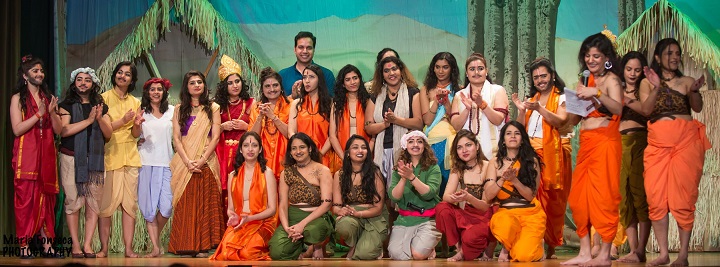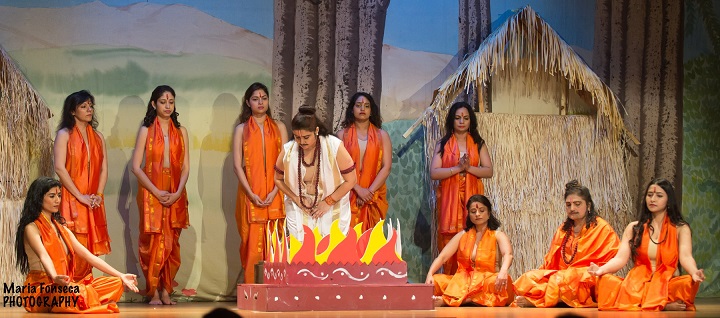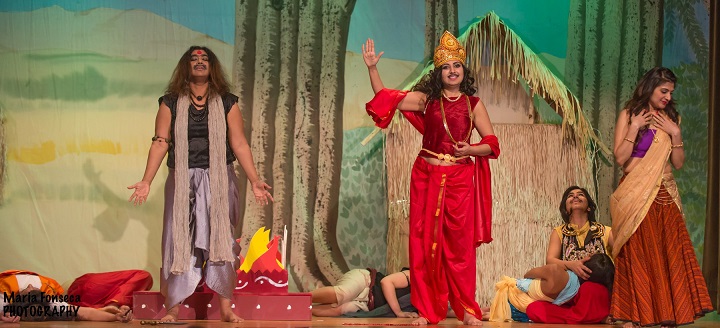Contribute
| Talent Reigns In Enactment Of “The Fire And The Rain†By 28 Member Female Cast |
Shuchita Rao
05/03/2018
The play with a complex plot, enacted in the English language, was based on the myth of Raivya, Paravasu, Arvasu and Yavakri, described in the Vanaparva of the epic, Mahabharata. In a fire-sacrifice which is arranged by a king to invoke rain in a drought ravaged region, Raivya and Varadwaj are the two Brahmins who compete to become the chief priest. Raivya’s son, Paravasu is chosen to be the chief priest. Varadwaj’s son Yavakri goes to the forest to do penance and to attain enlightment. He succeeds in attaining Bramhagyan. On his return after ten years, in a bid to avenge the death of his father, he seduces his old flame Vishakha who is now married to chief priest, Paravasu. Paravasu’s father, Raivya, who is jealous of his son’s status and also knowledgeable of Visakha’s infidelity exploits her, and creates the Brahma-Rakhshasha, Kritya, to kill Visakha’s lover, Yavakri. Vishakha, who is upset with Yavakri pours out the holy water that holds the potential to save Yavakri from death. Kritya, the Bramha-Rakshasa kills the defenseless Yavakri. Paravasu meanwhile kills his father Raivya and puts the blame on his innocent younger brother Arvasu. Deeply in love with a hunter girl, Nittilai, Arvasu wants to meet her father and elders of her tribal community to request her hand in marriage. Nittilai is married away to a boy of her own caste because Aravasu fails to arrive in time for a meeting of elders in the forest who had assembled to hear Arvasu’s appeal for Nittilai’s hand in marriage. Nittilai, who misses Arvasu, runs away from her husband in order to meet Arvasu. Together, they come across a theatre manager who offers Arvasu a role in his play. Arvasu, who has been barred from acting by his older brother Paravasu and the societal norms surrounding Brahmins, decides to accept the offer and plays the role of Vritra. In the heavens, Lord Indra is jealous of his brother Vishwarupa. Vritra tries to protect Vishwarupa but Indra drives him away and kills Vishwarupa. Nittilai, meanwhile is murdered by her husband and Arvasu is grief-stricken. Lord Indra offers a boon to Arvasu. Arvasu is on the verge of asking for his beloved, Nittilai to return to life when Bramha-rakshasa Kritya comes along and begs Aravasu to ask Indra to liberate him. Arvasu obliges Kritya. It rains, finally bringing relief to the drought-affected land and the entire kingdom welcomes the rains in a joyful and celebratory dance.
A large backdrop screen showing a verdant forest setting, elegant stage props, bright costumes and accessories, excellent makeup, fitting pre-recorded background music and fine acting by the twenty-eight member all-female cast made the play engaging. Four lively dances choreographed by four different choreographers included modern as well as folk dances executed with flair by a team of local dancers. “We practiced for a couple hours every Sunday for about two months†said dancer Pallavi Gupta. Music effects by Pradeep Jaychandran were well-suited to the play. “I carefully researched videos to see what would align best with this play’s theme. The work was more like sound engineering where I extracted sounds of chirping birds and animals like the panther from videos and used them in this play†said Jayachandran.
The play was well-attended. “I like the fact that the women have retained their original voices on stage without trying to deliberately change them to be like male voices. I appreciate all the work that has gone into this production. Such theatre ventures should be encouraged whole-heartedly†said play attendee Jaya Batra of Pawtucket, Rhode Island. “The plot was fascinating and I loved this production†said DeeAnn Williams who heard about the play from one of the stage performers and decided to attend it.
SETU’s mission is to build bridges between Indian and Western cultures through the medium of theatre and has produced plays such as Ramayana, Mahabharat and Shah Jahan since 2003. “This play is not about women pretending to be men. Rather, it is about giving women the opportunity to take on roles that were created for male actors holding aggressive, destructive and violent characteristics. Male chauvinism performed by women will bring to the audience’s attention, the unspeakable behavior that is often accepted as norm in Indian Society.†said SETU director, Subrata Das.
Social Media tool Facebook had several posts from the founders, director, performers and play attendees. “I am proud of each and every SETU actor and dancer who performed in “The Fire and the Rain†by Girish Karnad. They all were completely immersed and did not hesitate a bit to completely change their persona to fit the role they were depicting, and that not only just included gender reversal but more importantly the character itself. You were dedicated and respected your director’s vision and listened. I don’t want to single out any particular picture or person†wrote Jayanti Bandyopadhyay, co-founder of SETU and a key member of the production.
“Thank you SETU. I learned so much! What an opportunity to perform such a negative role. Thanks to Subrata Das for the constant support, tips, and the lantern†wrote Kumkum Pareek Malik who played the role of Raivya. “Words can’t do justice to the feelings this play evoked. This was a powerful, unique combination of characters played very well by all-female cast! You have raised the bar for future productions†wrote crew member Gopika Narula.
Kudos to the director Subrata Das, production team and members of the cast and crew. 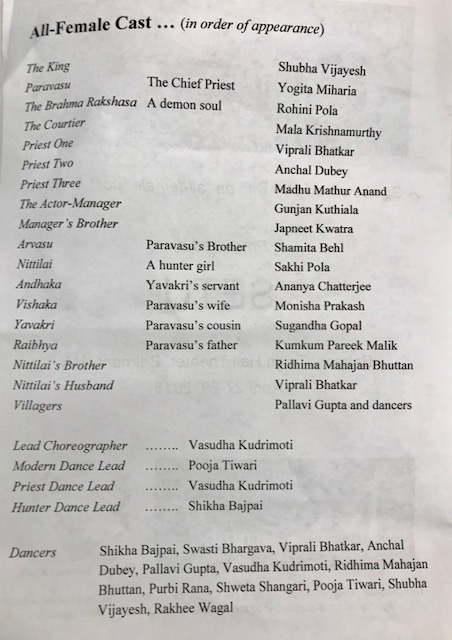
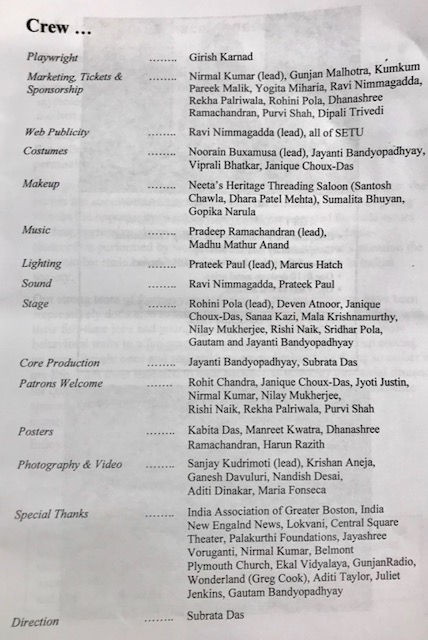
You may also access this article through our web-site http://www.lokvani.com/
